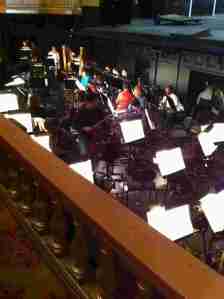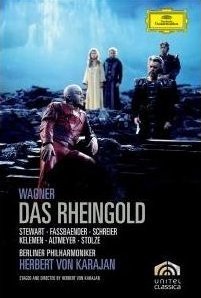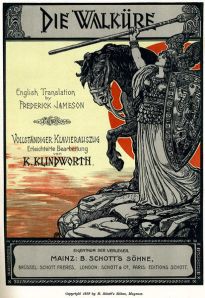Opera.
Before you roll your eyes or yawn, I want to ask you a few questions. Does a good drama make you cling to the edge of your seat in anticipation of what’s going to happen next? How about love stories- do you find yourself getting caught up emotionally in the outcome of what happens when two characters lock eyes for the first time? Not your thing? How about a good sword fight- there aren’t enough sword fights with the actual clash and clang of metal ricocheting on metal…
The opera is so much more than meets perception.
Let’s take another pass at this, shall we? Were you in line for the midnight showing of all three “Lord of the Rings” movies? Can you quote whole sections of the movie? Are you the rightful owner of the sword Arwen wielded holding back the Nazgul? Did you get married in a church that rather resembles the great Hall of Rohan?
Answers for this last section: a.) Yes- all three, but not in costume. There are limits. b.) It sounds like a noble endeavor. c.) A certain man we will call Beck does possess such a prize. d.) Yes, yes, a hundred times yes, though Theoden did not officiate.
For all you Lord of the Rings fans out there, let me present to you the original story of The One Ring. It comes from an opera by a German composer, Richard Wagner, entitled “The Ring of the Nibelung.” Several things of note here: Wagner is known for his use of leitmotif, which Merriam-Webster online defines as “an associated melodic phrase or figure that accompanies the reappearance of an idea, person, or situation especially in a Wagnerian music drama.” “The Ring Cycle” as it is known consists of four operas, which rarely get played back to back by a single opera house.
If you act quickly and happen to live in the San Francisco Bay Area you can see the entire Ring Cycle at the San Francisco opera for a limited time.
Before I get ahead of myself, I got initiated into opera at a young age.
My dad lay on the couch and I toddled into the room as he watched Placido Domingo in the role of Alfredo singing of drinking and living the good life boisterously as he locked eyes on new lady love Violetta. “La Traviata” holds a special place for me still today as my first opera with me lying beside my father crying at the end and wondering if the music had inspired the tears or the plot line. You can imagine how incredibly memorable it was then when friends, Katy, Alan, Raina and JoVincent sang several arias at our wedding reception. I smiled looking on and thinking how much my dad would have loved it.
Do you have a bucket list? During one conversation my Dad told me in that very Dad tone he took on when he stepped into the role of sensei-Dad, “I would like to go see the entire Ring Cycle before I die. Annelies, it’s loong, but if you can do it once, it’s worth it.” He never got to fulfill that desire and surprisingly the San Francisco opera opened its doors to lucky little me.
I must admit that the San Francisco opera house is stunning inside. I snapped a few pics to bestow some of that glittery gloriousness to you. Dear Alastaire, one of my favorite tenors and a good friend, bestowed the honor and gift to me of attending the final dress rehearsals to “The Ring of the Nibelung.” For two weeks, my life revolved around the War Memorial house and I must say it was an exquisite escape from the everyday… I even took a half day vacation from work to see the rather lengthy “Göetterdämmerung”.
That’s about 17 hours of opera. My dad wasn’t kidding, but here’s the thing- the storyline is fascinating, if not weird in certain parts that an hour breezes by without batting an eye.
Can I applaud publicly the San Francisco opera for running all four at the same time? *Applause* As someone transfixed when in a good tale, you really do miss something to see them years apart. Instead, if you’re able to see the four around the same time period, then it allows for a greater immersion into the story. (This reminds me of my renewed desire to watch all LOTR movies in a row sometime soon. If that appeals to you too, leave a comment. Maybe we’ll make it a party.) I’m going to try to succinctly summarize each of the story lines of the four operas today and tomorrow. So let’s get started…
I. Das Rheingold
II. Die Walküre
III. Siegfried
IV. Göetterdämmerung
I. Das Rheingold
The Rhine maiden sing about the gold glittering at the bottom of the river. Suddenly a man appears entranced with them. As they are teasing him, one of them spills the secret of the gold in their river: if it is gathered and forged into a ring, the owner of that ring will rule the world. The thing is, they sing, you have to renounce love. This man turns out to be Alberich, lord of the underworld. He steals the gold and takes off much to the devastation of the Rhine maiden you hear bemoaning their lost gold later.
Wotan, the all-father (like Zeus) and his wife Fricka await word on the construction of Valhalla. Giants, Fafner and Fasolt, who are brothers, come bringing good news of the completion of Valhalla. With the good news comes the bad as they require the payment agreed upon by Wotan and the giants: Fricka’s sister Freia. Wotan never intended to pay by giving Freia to the giants and he begins looking for an alternative, waiting for the arrival of Loge, lord of fire. Loge tells them of Alberich’s deed and how he has forged the ring of power. Wotan and Loge contrive a plan to steal the ring on behalf of the giants and in exchange for Freia.
All goes as planned after Wotan and Loge visit the underworld. They watch Alberich boast of the magical properties of the Tarnhelm, crafted of river gold by Alberich’s brother Mime. When someone puts the Tarnhelm on, they can shapeshift or disappear. Loge tricks Alberich into turning himself into a toad and they whisk him and the treasures away. As they steal the ring and Tarnhelm from Alberich, he curses the ring and proclaims anyone who owns it will die.
Remember the ring has tricks of its own and a power no man can resist. Wotan struggles with giving the ring to the giants and receives heavy words from Erda, the lord of the earth. (Her voice was like hot buttered rolls. Silky, rich and smooth!) Wotan relents and watches as Fafner and Fasolt fight over who gets to wear the ring. Fafner kills his brother Fasolt and all are privvy to see the power of the ring. Fafner leaves with the newfound golden booty, the Tarnhelm and the ring. The gods set off for Valhalla.
[Things that happen in the interim of the story, between Operas I and II]
- Fafner has turned himself into a dragon and is guarding his golden stash.
- Wotan fathers his warrior daughter Brünnhilde and the eight other Valkyries, daughters of Erda
- Wotan goes to earth and sires the mortal twins Siegmund and Sieglinde.
II. Die Walküre
A fugitive seeks refuge in Sieglinde’s house. She invites him in and feels herself drawn to this stranger, but lets him know he can stay only until her husband Hunding returns from a hunting expedition. Of course this doesn’t go over well with Hunding who hears this man’s story of woe and realizes the man he’s been searching for is now in his house. He offers a night of shelter to the fugitive and challenges him to a duel in the morning. The fugitive is unarmed but remembers something his father once told him- that there will be a sword in his hour of greatest need (Notung! I love the leitmotif used to sing about the sword!). In the middle of the night, Sieglinde has drugged Hunding and comes down and frees the fugitive. She tells him of her unhappiness and of the sword thrust into the ash tree in the middle of their house. An old man put it there saying only a man of noblest honor can pull it out. Sieglinde tells him Hunding and all of his cronies have tried and failed. She watches as he pulls the sword out, having a moment of clarity and recognizing her long lost twin brother Siegmund in this fugitive. They flee. (This is where it gets weird people. I’m not going to lie.) Siegmund and Sieglinde pledge themselves in love to each other as brother and sister AND in the husband and wife sort of way.
Meanwhile Wotan is happily ensconced in Valhalla, charging his warrior daughter Brünnhilde to take care of his mortal son Siegmund. (You are also introduced to the leitmotif for Brünnhilde which is an easily recognized bit of opera music in non-opera settings.) Their meeting is cut short as Fricka enters upset and wheadles Wotan to strike down Siegmund by letting Hunding triumph. As the patron lord of marriage, Fricka requires it and is disgusted by the incestuous relationship that has destroyed the marriage. It’s also a barb at her philandering husband. Brünnhilde comes back in and her father tells her she must let Siegmund die in the duel. Ever in his mind, Wotan is constrained to take on the ring of power on his own. He has decreed he won’t and yet the ring remains in his thoughts. His Plan B of grooming Siegmund as a free mortal to seek out the ring is foiled. Siegmund and Sieglinde are on the run from Hunding. As Sieglinde is resting, Brünnhilde appears to Siegmund in a dream and calls him to follow her to Valhalla. He refuses to go once she tells him that Sieglinde cannot accompany them. Brünnhilde finds herself moved by the twins’ devotion to each other and decides to go against the plan Wotan laid out. She decides to protect Siegmund and pledges to protect Sieglinde. We learn later that as the arm of Wotan she knew his conflict- wanting to protect his son, but being forced into an agreement with Fricka. Even as he clung to the agreement with Fricka, she tries to protect Siegmund. Hunding arrives and all hell breaks loose. Wotan shows up furious and shatters Siegmund’s all-powerful sword into pieces. Siegmund is struck and dies. Wotan has kept up his end of the bargain with Fricka and thus kills Hunding. Brünnhilde and Sieglinde escape with the shards of (Notung!) the sword. Wotan is seething with anger and looking for Brünnhilde.
Brünnhilde’s eight sisters, the Valkyrie head to Valhalla and learn of this rupture in their sister’s relationship with their Father as Brünnhilde shows up to Valhalla with Sieglinde. She tells them she is on the run from Wotan and asks them to help shelter her from his wrath. The Valkyrie are horrified and refuse. Brünnhilde tells them that Sieglinde is pregnant and they are roused to help her. Sieglinde beseeches them with a rousing plea and she escapes for the woods with the sword (Notung!) to dwell near the dragon Fafner, where Wotan is sure not to look. Wotan arrives looking for Brünnhilde intent on punishing her. He takes away her immortality and her role as a Valkyrie. He sentences her to a long sleep to be woken up by the first male that awakes her. (Lest you get all Snow White or Sleeping Beauty here, this is the worst thing she can imagine. As a warrior daughter, she is losing her independence to whoever rouses her. Desperately, she asks Wotan to let it be a man of honor and for an obstacle to be put in his way. This particular set of music is so poignant. The father and daughter talking through the difficulty of parting forever, of what went wrong. Wagner might as well hit me over the head with a two-by-four at this point.) Brünnhilde falls asleep on a rock and Wotan summons Loge to circle the rock with a ring of fire only the noblest of men can penetrate.
[Final notes:]
Nina Stemme who plays Brünnhilde could very well be the quintessential characterization of this role. Through her acting and vocalization, the audience is emotionally drawn into this heroine of heroines. Her lush and dramatic vocals both summon tears at times and smiles for her early bravado. Mark Delavan as Wotan carries the role well vocally and gives a commanding performance. I bring these two up because their synergy on stage is palpable. Together you sense the depth of their bond that is then inextricably severed.
At this point, you’d be 7 hours and 40 minutes in over two operas and several days. I say this because I feel like I skated over the storylines and left out the incredible subtleties worked into the operas.
Stay tuned tomorrow for Part 2!






